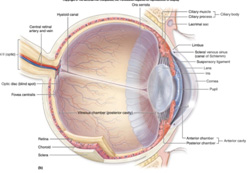Diabetic Eye Care
Diabetic eye disease is a group of eye problems that patients may develop as a complication of diabetes. All can cause severe vision loss or even blindness.
 Diabetic eye disease may include:
Diabetic eye disease may include:
Diabetic retinopathy is a leading cause of blindness in American adults. It is caused by damage to retinal blood vessels.
Diabetic retinopathy —damage to retinal blood vessels. Cataract—clouding of the lens of the eye. Cataracts occur more frequently and at an earlier age in diabetic patients.
Glaucoma — Optic nerve damage and vision loss that is often associated with elevated eye pressure. Diabetics have a higher risk of developing glaucoma.
What is diabetic retinopathy?
In some people with diabetic retinopathy, blood vessels leak fluid and cause swelling in the retina. In other people, abnormal new blood vessels grow on the surface of the retina. The retina is the light-sensitive tissue at the back of the eye. A healthy retina is necessary for good vision.
Mild diabetic retinopathy can exist without producing any changes in vision. However the retinal damage can progress and cause vision loss. If the retinopathy is not treated, irreversible blindess can result.
Who is at risk for diabetic retinopathy?
People of any age with type 1 or type 2 diabetes are at risk. It is very important for diabetic patients to get a comprehensive dilated eye exam by an ophthalmologist at least once a year. The longer you have diabetes, it becomes more likely diabetic retinopathy will develop. Between 40 to 45 percent of Americans with diabetes have some stage of diabetic retinopathy. If you have diabetic retinopathy, timely treatment can help prevent its progression.
Diabetes can sometimes develop during pregnancy in women who did not have it previously. All pregnant woman with diabetes should have a comprehensive dilated eye exam as soon as possible. Your ophthalmologist may recommend additional exams during your pregnancy.
What can I do to protect my vision?
If you have diabetes get a comprehensive dilated eye exam by a board certified ophthalmologist at least once a year. Do not wait until symptoms develop to have your eyes examined. When vision is damaged by diabetic eye disease, it is not always possible to return it to normal. Keeping your blood sugar and blood pressure under control reduces the risk of developing diabetic retinopathy. Speak to your primary care physician to help manage this.
The board certified ophthalmologists at West Suburban Eye Center can find diabetic retinopathy at its earliest stages. We also have state of the art ophthalmic equipment to perform a variety of retinal studies, including retinal photography, OCT scanning, and fluorescein angiography. These tests can help determine when retinal laser treatment is appropriate to preserve vision. Our ophthalmologists have over twenty years combined experience in performing retinal laser treatment of diabetic retinopathy. We also understand the role of an ophthalmologist is a member of a health care team working together with an individual to treat their diabetes. We will explain our findings to you and your primary care physician to assist in the collaborative management of your diabetes.
The first step in diabetic eye care is scheduling your eye exam. Please call West Suburban Eye Center today and add us to your health care team.
We minimize patient waiting and answer all your questions completely at each visit. Make an appointment today and let us exceed the “standard of care” for you.

